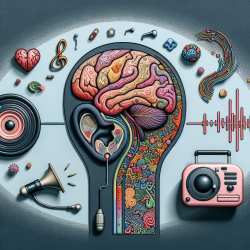As a practitioner working with older adults, understanding the intricate relationship between hearing loss and brain health is crucial. Recent research has highlighted significant associations between auditory deficits and changes in brain structure, particularly in individuals at risk for or diagnosed with Alzheimer’s disease (AD). This blog explores these findings and offers practical insights to enhance your therapeutic approach.
The Link Between Hearing Loss and Cognitive Decline
The global prevalence of Alzheimer’s dementia is expected to triple by 2050, underscoring the importance of identifying modifiable risk factors that could delay its onset. Hearing loss has emerged as a significant factor, with studies indicating its association with cognitive decline and brain atrophy. The research article "Hearing Loss is Associated with Gray Matter Differences in Older Adults at Risk for and with Alzheimer’s Disease" provides valuable insights into this connection.
Key Findings from the Research
- In individuals with subjective cognitive decline (SCD), greater pure-tone hearing loss was linked to lower right hippocampal volume.
- No significant association was found between pure-tone hearing loss and brain atrophy in those with mild cognitive impairment (MCI) or AD.
- Individuals with AD exhibited poorer speech-in-noise thresholds compared to those with SCD.
- Greater speech-in-noise thresholds were associated with lower cortical thickness across much of the cortex in AD patients.
Implications for Practice
The findings suggest that early intervention in hearing loss could play a role in maintaining cognitive function. Here are some ways practitioners can apply these insights:
1. Early Detection and Intervention
Encourage regular hearing assessments for older adults, especially those reporting cognitive difficulties. Early detection of hearing loss can lead to timely interventions that may mitigate its impact on brain health.
2. Integrating Auditory Therapy
Incorporate auditory therapy into treatment plans for individuals at risk of cognitive decline. Techniques that improve speech-in-noise recognition can be particularly beneficial for those with AD.
3. Multidisciplinary Approach
Collaborate with audiologists, neurologists, and other healthcare professionals to provide comprehensive care. Addressing both auditory and cognitive aspects can enhance overall treatment outcomes.
Encouraging Further Research
The complex relationship between hearing loss and cognitive decline warrants further investigation. Practitioners are encouraged to stay informed about emerging research and consider participating in studies that explore innovative interventions.
This comprehensive study provides a foundation for understanding how auditory health impacts brain structure and function. By integrating these findings into practice, practitioners can contribute to improved quality of life for older adults facing cognitive challenges.
Conclusion
The link between hearing loss and brain health highlights the need for proactive measures in managing auditory deficits among older adults. By implementing strategies informed by recent research, practitioners can play a pivotal role in preserving cognitive function and enhancing patient outcomes.










